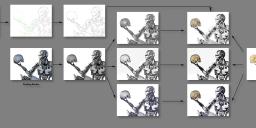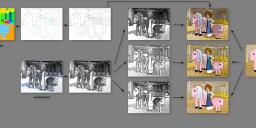Oso Toon Shader for Iray for Sale! [Commercial]
 Oso3D
Posts: 15,044
Oso3D
Posts: 15,044
It's here! https://www.daz3d.com/oso-toon-shader-for-iray
Been working on this one for a while!
Oso Toon Shader is a modified version of Iray Uber Shader, designed to produce renders useful for creating non photorealistic artwork.
It isn't a one-click solution, but rather a tool to create a variety of images.
I'm attaching the Documentation, which outlines the details of what it does and how.
Someone might ask... why all of this, when I can just render something and apply an art filter?
Well, one critical problem is that an art filter can't tell that a patch of gray is part of a foreground object or background, it has no sense of what objects are where. Being able to separate lines by object/surface and color information from basic shading gives you a lot of room to play around.
If nothing else, I've found it really enjoyable creating sketchy pen and pencil style illustrations.
Oh, and that's the other thing... these are fast renders. I've rarely needed more than two minutes to render the outlines or flat color. And while the gray shading can take a little more time, it's still pretty quick.
I'm excited about this, and hope you are, too.








Comments
Some more examples...
I saw some of the images when you were working on this (I assume) in the NPR thread. Looks really cool, and looking forward to this. Are the outlines with the material ID working with trans maps? It appears to be in the PDF, but I'm not sure if the hair is modeled that way.
So your shader will be a bunch of presets as illustrated in your PDF & those posted images?
I'd like a iRay toon shader like those.
Almighty: The outlines work with trans maps, yes. What I did was code a shader so that there's a switch so you can do a regular render, but use MaterialID color as the emission color. This bypasses some of the issues with using a regular materialID canvas.
Nonsesuch00: You'll still need to take 2-3 renders and manipulate them in the image editor of your choice. Where a lot of the art style comes in is the shading render (basically, black and white with no color information but all light and shadow).
By filtering this in Photoshop, GIMP, FilterForge, FotoSketcher, or a wide variety of other programs, you can create an interesting layer that will interact with the color layer in various ways. Or you can make something like a pencil sketch and add the outline on top to get a good 'drawing' look.
So no, there aren't presets that will spit out 'half-tone sketch look.' But you can quickly get some renders that you can experiment with and create a wide variety of looks. And I do mean quickly; I have GTX 970 cards, which are good but not top of the line, and I can usually complete all the renders at 2000x2000 in a total of 10 minutes.
Excellent news, very much looking forward to this!!
For what it's worth, while I understand the appeal of one-click solutions, having lines, shading, and flats render out separately is extremely convenient for making adjustments afterwards, so the process the way you laid it out here makes sense to me.
I'm looking forward to this one, too. Very nice.
Wow...very cool :)
Laurie
OK, I was thinking when I was reading that PDF is why is he telling us how to do all the steps because then we won't buy his shader package. I will buy even though it's more work because I definately want to do more stylized toon renders. But need very good instructions and postwork combo instructions too for Gimp as well.
Looks very good but are you rendering CPU, GPU what are you computer specs? its not much use too just say it renders quickly especially if you have a high powered computer with a large Vram graphics card.
I have an Alienware Area 51 with two GTX 970s. Fast but not top of the line.
And it’s not much more time consuming in cpu... maybe 2-3 x as long.
Two of the render steps use max path length 1, which DRASTICALLY reduces the computations needed to render.
Lot faster than I have, but then most have.
I really like the look you are getting its just if it requires 2-4 renders and each render takes 2-3 hours thats a long time.
Have you sent it to any testers yet, I just wondered what their finding were, I'm hoping that it isn't too slow, I'd probably purchase it as I really miss the toon effect.
Is this 'Coming Soon' in that they've told you a release date, or 'Coming Soon' in that you've sent it off to QA?
While I understand your explanation about what the product does and how you believe the multiple render passes plus post is the optimal way to achieve your results, I am afraid the process is much more involved than a straight up shader or a simple (insert airquotes) postwork via filter. After reading your manual, I kinda get a tutorial vibe, maybe you could expand a bit on it and sell the product as a tool-tutorial combo to achieve NPR in Iray? I mean, I am sure people who know how helpful you are in the forums won't hesitate to buy it and pester you relentlessly afterwards, but maybe more casual shoppers will get overwhelmed at first blush and stop there. Also, if you go the tutorial route... can we get some tips on how to achieve those gorgeous chinese painting results that you did for that RPG? Because just that would sell me on nearly anything it was attached to.
Dreamfarmer: A release date is imminent! Which I can't tell you!
Uthgard: The materialID and Flat color steps, even in CPU mode, only take a minute or two each at 2600x2000. Unless you're rendering on a toaster, I'd be shocked if it took any significant length of time. (I mean, maybe Winter Halls filled with several hundred figures...)
Gray mode, same deal, you can get a somewhat grainy result in a minute or two. Whether that's good enough depends highly on what sort of filter you are using.
Again, all tested in CPU mode.
I'll go have a strict talk with my budget spreadsheet. :-) Are there more promo/sample/tests somewhere I can look at meanwhile? I've been poking at figuring out the best way to generate renders for Clip Studio Paint EX to convert so I'd love to see more of what you've done.
This looks intriguing, Will! I’m interested to see whether it will make creating Manga-style toon renders easier. Perhaps blending this with Line Render 9000 to create the stroke variation and then using your shader for flatting and such. I look forward to seeing this in the store!
Some more toonish types.
Looks great, Will.
Sure do.
Yes! Your Sakura Toon is more what I was imagining. Nice work!
Can't wait for this product to be release. Wonderful work Will.
Yes thats one I like as well.
How many layers/renders are required to get that sort of effect please?
Three; materialID pass to get the outlines, flat color for the, well, color, and shading pass to get a grayscale that can be manipulated.
I think with Sakura Toon I did a simple two tone shading: use Threshold to reduce the shading to black and white, use Levels to change it to gray and white, then make it a Multiply layer on top of the color. (Or maybe Soft Light, that sometimes looks cool)
Waittttting foreeeevvvvver.
Imagine how I feel! :)
I want to make a joke about ‘imminent’ and ‘immanent’ but the latter turns out not to mean quite what I think it means.
I think Sketchy was released on day 2 of MM last year. I’m thinking your shader must be ‘New Doug’. Or well ‘New Sketchy’, slotwise.
Do you have anything else to tease us with?
Here's another example. Total render time is maybe 4 minutes (and that's mainly because I wasn't happy with the original outline pass).
All told took about 90 minutes start to finish, and it only took that long because I was interrupted constantly by my kids. ;)
Getting the Material IDs just right will be somewhat of an art; the random script will assign stuff, well, randomly, but you will want to play with the colors so that you get lines where you really want them.
First image is Shading pass run through FilterForge's Watercolor filter, second adds (well, multiplies) a slightly blurred outline from MatID pass.
This looks much better than Sketchy so far.
This looks really good! I'm very much looking forward to it. I love NPR render products and this one looks great!
I noted that you said that you have to use a photo-editing program to get the certain looks, will there be a step by step tutorial that tells how to get specific looks/styles from the shader set? (Forgive me if that's already been addressed in this thread - I didn't read all the posts).
Diva: The first post has the pdf for instructions on using the product, which should give some idea of how things work.
It is important to note that Oso Toon by itself doesn't create many NPR effects -- I don't want to mislead anyone. However, it makes it much easier to do so, and takes advantage of a lot of my experiments with 3DL and Iray and other NPR work. Basically, I've run into loads of obstacles in the past, and made Oso Toon to get around them.
The big problems you'll normally run into:
Normal based outlining often runs into trouble with flat surfaces angled to the camera. I added a nifty Edge Line effect that can be used instead. Combined with materialID step, you can make sketch effects that are much 'cleaner' than most other approaches create. A lot of render filters end up with some lines being too thin, other lines running thick and almost like a bad photocopy. Oso Toon helps avoid this problem.
Outlining following colors rather than shapes. An algorithm can't tell 'brown pants' from a darkish shadow behind the figure, and outlines it all together. Woops. With Oso Toon, separating out color gives you a LOT more control. You can manage outlines around objects and shading filters, then add in the color.
You can even use Oso Toon to provide a simple form of ambient lighting; do a Flat Color render, and then add it over a normal render, and Opacity basically becomes an ambient lighting slider. Mind you, you will probably only want a TINY bit of it, but the extra render will probably only take a few minutes, at most.